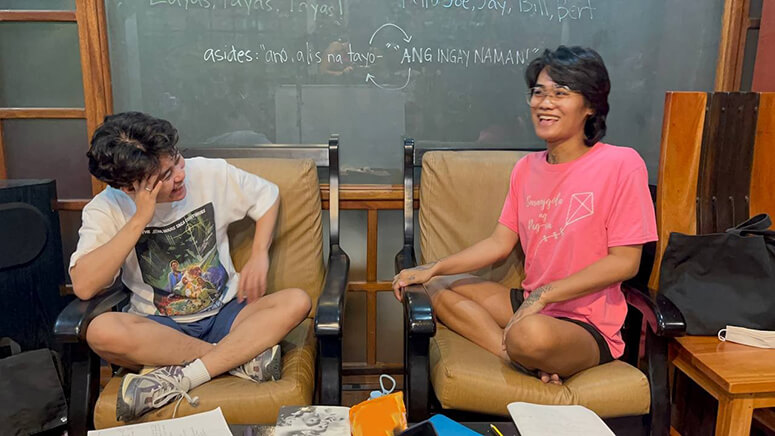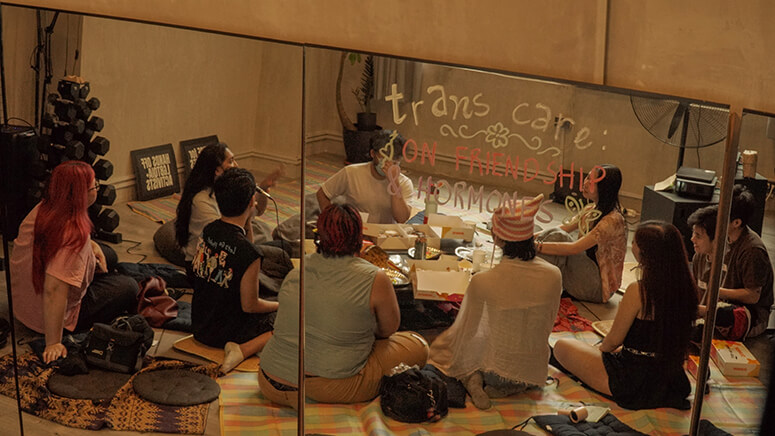The cost of being a trans actor, as told by Serena Magiliw and Zoë de Ocampo
In its earliest iteration, The Trans Actor, a project wrestling with the lived experiences of trans performers in Philippine film and theater, was a documentary film, training the camera on its creators, Serena Magiliw and Zoë de Ocampo, but the two lacked the deep pockets needed for the project’s fruition.
“I started doing interviews with Zoë, so lumalabas-labas kami from time to time, tapos pera ko (ang) gamit,” says Magiliw over Zoom. Though the duo got the backing of a production house, it unfortunately didn’t pan out, forcing them to pause and mull over the project.

This month, The Trans Actor finds a second life as a workshop-performance under Trans Midya, a grant project centered on trans craft and visibility in media supported by the “Shift the Narrative Fellowship” of the Urgent Action Fund for Women’s Rights, Asia & Pacific. The show is set to run this June 28-29 at Myra Beltran’s Dance Forum in Quezon City.
Magiliw and de Ocampo first met in 2023 at the rehearsals for Marjay Manalastas’s Virgin Labfest hit Ang Tuyom. After working on her personal project SÁRI/SARÍ, another workshop-performance series exploring queer-trans embodiment in film and theater, Magiliw at the time was keen on birthing another project focused on the trans experience in media. “Interested ako (about that) after meeting Zoë,” continues Magiliw, “at pwede ko siyang i-share with a transmasculine experience para sa mas spectrum na pagtingin, so in-invite ko siya.”
After securing a seed grant from the Goethe-Institut Philippinen, they staged the experimental docutheater performance I’m allowed to be a fully formed person in August last year. Then came Trans Midya, whose first leg in March featured a series of workshops and performances about trans care, trans amory, trans excellence, and trans power, helmed by the likes of Stef Aranas, Pette Shabu, and Lakan Umali, who were all part of Young STAR’s 2024 Pride cover, alongside Magiliw and de Ocampo.
(We’re) not really the ones telling our own story. That was the narrative I wanted to shift, like taking the means of production into our own hands.
Magiliw, who also facilitates intimacy coordination for theater actors, says the vision for Trans Midya and all the projects it shelters comes from an intention to reclaim the trans narrative from the gaze of individuals who do not have any meaningful access to the trans experience.
“In my experience as a trans person here in the Philippines, mostly (hindi) trans (people) ‘yong may hawak ng narrative natin,” she explains. “When represented in media, when written works are shown in mainstream platforms, mostly tayo ‘yong nakaharap, tayo ‘yong subject, but (we’re) not really the ones telling our own story. That was the narrative I wanted to shift, like taking the means of production into our own hands.”
If last year’s I’m allowed to be a fully formed person was directed towards people that Magiliw and de Ocampo no longer intend to work with, The Trans Actor now gestures towards inviting more trans creatives to take up space through their craft and voice.

“Kasi narrative ‘yong pinag-uusapan natin, so sino ba dapat ang nagkukuwento ng mga naratibo natin kung hindi tayo din?” Magiliw asserts. “Kasi tayo talaga ‘yong nakakaalam, like thank you sa mga allies na nagsusulat at nagdi-direct, nagpo-produce ng mga kwentong trans. Pero malaki pa rin ‘yong gap na nakikita namin, especially sa proseso na pagkatapos pagkakitaan, hindi na siya natutuloy labas doon sa work.”
De Ocampo, who also hops on the Zoom call, proceeds to talk about the intimacy of working with fellow trans artists outside of film and theater through Trans Midya’s first leg, and the liberating notion of not having to explain their transness before an audience. “The conversations flowed so easily, and I think for a lot of us, there’s not a lot of opportunity to be in spaces where we can just talk about our craft head on,” he says.
The Trans Actor also takes cues from the workshops last March, as it is chiefly concerned with equipping trans talents in media with skills and knowledge about the economic, political, and cultural conditions factoring into performance-making.
But Magiliw clarifies that the show doesn’t emulate the rigid conventions of workshops. “We still wanted to incorporate our language of performance into it for more engagement or a more cohesive participation ng viewers,” she says. “Pero definitely may focus (on our) unique experiences as actors when it comes to the process of performance-making, of acting, of auditions.”
At the same time, de Ocampo notes the limits of the staging. “I think our perspective is (still) Manila theater, so hindi siya teatro sa nayon,” he shares. “Parang meron din kaming unspoken disclaimer na as much as it’s called The Trans Actor, we don’t claim to be the trans actor of Philippine theater and film.”
The duo didn’t intend to conceive a scripted or straight play, or any text-based performance, precisely because they hope to show “the rawest form of ourselves.” The project then involves a whole lot of devising sessions and peeling back of their experiences in sets, auditions and rehearsal spaces, as well as how the trans experience has been rendered on and beyond the page, and how trans people are vexingly viewed in mythic, limiting terms.
Throughout their research, Magiliw and de Ocampo also discovered the lack of documentation for trans and queer performances. “Sobrang nahirapan kami mag-reference ng actors from our childhood,” de Ocampo recalls. “Or kung gusto ko mag-stage ng trans na play, I have to pull from off-Broadway because I don’t have access to the grassroots performances na meron ngayon.”
“So may tiny part of me thinking na we also kind of have a responsibility to document this thing,” de Ocampo adds. “To make it something that doesn’t end with four performances for Pride Month. It needs to be easier to find, these trans performances.”
This is also the reason why Magiliw intended for the project to originally culminate in a documentary film. “Kapag theater kasi, we have one time lang tapos it takes a lot of resources kapag i-stage namin siya nang paulit-ulit,” she says. “So inisip ko ‘yong practicality na if recorded siya, we can distribute it to other spaces, makaabot siya ng iba’t ibang platform para mapanood siya ng mga tao.”
In last year’s cover, I asked both actors about the cost of being a trans talent in the local film and theater scene, and both emphasized the precarity of the situation. A year later, Magiliw recognizes the micro wins. “Parang I am visible in reference to the previous works that I’ve done,” she observes. “I can say that people are watching; casters, directors, producers are at least seeing the work that I am doing.” But she’s well-aware that it can only go so far. “Ang nakikita ko sigurong trend ay hindi pa rin maiwasan (that) these works are not pioneered or initiated by the trans experience.”
De Ocampo, meanwhile, still lives off a “soulless day job,” despite the steady stream of acting work offered to him. “I’ve been continuous since last year in terms of performance,” he says, “pero ang interesting and specific to me (is that) I do not play or I do not get asked to do trans roles.”
“I really appreciate and I love that steps are being taken,” de Ocampo continues. “Kunwari sa QCinema, trans narratives are more abundant now. But it’s a lot of transfeminine narratives. It has to do also with the commodification of women. Hindi ‘yan maihihiwalay doon. Pero it is a start.”
De Ocampo negotiates with these material constraints by living vicariously through the transfeminine actors he is surrounded by, if not looking at cis work and bending it in a way that makes sense for him. “Hindi rin of course maihihiwalay sa economic (aspect) because if there are trans roles, they’re not roles in commercial theater,” he adds. “It’s gonna be these small companies taking risks, wanting to tell stories, and ang kapalit noon ay, economically, hindi siya ganoon ka-sustainable. But we are really working to the bone, making our own spaces, making our own opportunities.”
This is where The Trans Actor intervenes, bent on interrogating dominant artistic methods and sensibilities fostered by the likes of Michael Chekhov and Sanford Meisner, and countering them through a meaningful trans framework just as it attempts to reject monolithic trans representation in Filipino media.
“There is a strong sense of reclamation because one chunk of the overall piece was nag-revisit kami ng past work,” de Ocampo says. “And I think to have chosen those pieces and to reinterpret them without the text and as just monologues that we could mold into our own thing created this strong sense of agency that, ‘This is my work, I directed it, I’m telling myself what it means, and akin na ‘to ngayon.’”
After a moment of illumination in the middle of our interview, Magiliw waxes nostalgic. “Kaya ko palang tumitig pabalik at magsabi ng ‘Hindi, hindi ko ‘yan tatanggapin.”
***
Trans Midya’s The Trans Actor will close out Pride Month with limited runs on June 28 and 29 at Myra Beltran’s Dance Forum in Quezon City. Purchase tickets for P350 at bit.ly/the-trans-actor. Follow Trans Midya at @transmidya.


